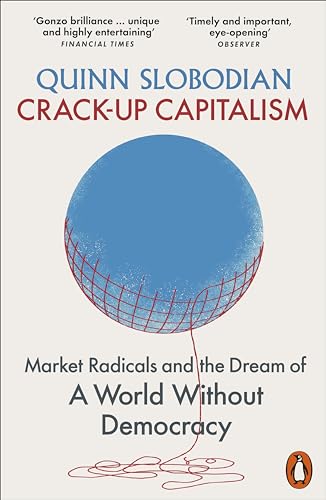Crack-Up Capitalism, Market Radicals and the Dream of A World Without Democracy
Quinn Slobodian
2023
 What if capitalism doesn’t need democracy anymore? That’s not a hypothetical—it’s the premise of Quinn Slobodian’s new book, Crack-Up Capitalism: Market Radicals and the Dream of a World Without Democracy. And it’s more than a critique. It’s a map of how the wealthy and powerful are engineering their exit from democratic society, one special zone, offshore haven, or blockchain utopia at a time.
What if capitalism doesn’t need democracy anymore? That’s not a hypothetical—it’s the premise of Quinn Slobodian’s new book, Crack-Up Capitalism: Market Radicals and the Dream of a World Without Democracy. And it’s more than a critique. It’s a map of how the wealthy and powerful are engineering their exit from democratic society, one special zone, offshore haven, or blockchain utopia at a time.
This isn’t the usual “capitalism vs. socialism” debate. This is about how capitalism is slowly decoupling itself from the public sphere altogether, and how that future is already here.
Slobodian’s core argument is deceptively simple: over the past few decades, powerful thinkers, libertarians, and investors have realized they don’t need to take over entire governments to get what they want.
Instead, they’ve pioneered a different strategy: crack open the state, carve out zones where market rules apply and democratic ones don’t and move capital—and people—into those zones.
These “crack-up zones” range from the familiar (Hong Kong, Dubai’s freeports, Silicon Valley tax shelters) to the experimental (charter cities in Honduras, floating seasteads, decentralized crypto-nations). What they share is an escape from collective governance. They are freedom – on corporate terms. Capitalism’s favourite places aren’t countries anymore.
Slobodian’s brilliance lies in showing how geographically scattered, but ideologically united, these places are:
- Canary Wharf, the privatized heart of London’s financial district
- Liechtenstein, a real-life micro-state marketed as a legal startup kit
- Dubai’s special economic zones, where migrant labor is exploited in a haze of luxury
- Prospera, Honduras, a libertarian city-within-a-country founded on investor rights
- Seasteading ventures, where Silicon Valley elites dream of governance-by-code
In each case, the story is the same: wealth and power create spaces of exception, where the laws that protect workers, the environment, or civil rights are dialled down—or switched off entirely.
This is not a typical economic history. It’s a sharp, politically charged read that asks: What happens when capital no longer needs the state? What happens when democracy becomes an optional feature of governance? What’s left of the social contract when money can always exit—but people can’t?
Slobodian doesn’t just expose these questions—he shows how elite ideologues have been working on the answers for decades. From Milton Friedman’s love affair with Hong Kong to modern crypto-libertarians dreaming of cloud governance, the thread is clear: freedom, but only for the few. “The modern world is pockmarked, perforated, tattered and jagged, ripped up and pin-pricked.” A metaphor for the Swiss-cheese map of “zones” that now dot the globe. “Capitalism works by punching holes in the nation-state… so that the lineaments of a future society without a state [can] come into definition.” “Freedom flows from the ability of individuals to choose the laws under which they live.”
The book isn’t perfect. At times, Slobodian’s examples jump too quickly across continents, and readers hoping for a stronger call to action may find the book stops short of naming a clear resistance strategy. In his book Slobodian is not describing a dystopian future. He’s describing the present.
Crack-Up Capitalism isn’t just a book—it’s a flashlight. It shows us where the shadows are. It helps explain why democratic reforms feel like they’re running on sand while wealth and power float away to privatized islands, digital vaults, and legal no-go zones. This book will change how you look at the map—and how you think about the future of democracy itself.




